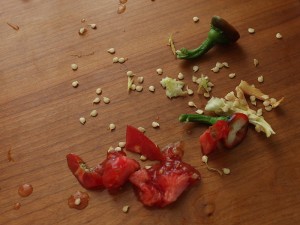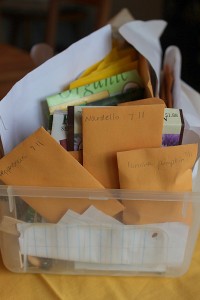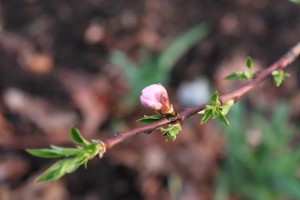 Trash or Treasure?
In this pile of salsa-making scraps, what do you see? Trash? Compost?
Trash or Treasure?
In this pile of salsa-making scraps, what do you see? Trash? Compost?
How about the genetic code necessary to plant a whole garden of peppers next year?
By taking a little bit of time now, in the height of the harvest season, home gardeners can save seeds for next year.
Which Seeds
Most popular Mid Western garden seeds are easily saved. Tomatoes, peppers, beans, and squash take little more than a piece of paper towel and a few days time. Others, like lettuces, radish, and cucumber, take a little more care but can still be preserved.
All seeds that you wish to save must come from open-pollinated vegetables, not hybrids. Hybrids are bred to not have viable seeds. The term 'heirloom' has little technical definition, so it will not help you determine whether the seeds will be viable.
If you are saving from your own grown seeds, check the original seed packet to note whether it is open-pollinated. If you buy from a farmer at the market, ask whether it is a hybrid variety or not. Most organic vegetables are open-pollinated.


How to Save
Choose a fully ripe vegetable from which to save seeds. Remove the seeds from the flesh. In the case of fruits with pulp around the seeds, like tomatoes and pumpkins, rinse or carefully pick the pulp off the seed.
Lay the seeds in a single layer on top of a labeled paper towel lined plate. Place the plate in a dry spot for 1-5 days or until the seeds are fully dry.
Herbs and lettuces produce flowers that contain their seeds. To collect these, allow the flower to fully mature and dry on the plant. Bring it inside, allow to dry a few more days, and shake the seeds out.
Transfer dry seeds to a small paper envelope. If the seeds are stuck to the paper, such as is often the case with tomatoes, it's ok to leave the paper attached. Label the envelope with the variety and date. Store in a cool dry place until spring.


Risks of Using Saved Seeds
There are two possible risks of using saved seeds. First, if you accidentally save a hybridized seed, the plant may grow and grow but never produce fruit. Boo! Second, it is possible to concentrate poor characteristics. I believe this happened with my Amish paste tomatoes, seeds I saved for four years. Each year I get more and more blossom end rot so I'm going to scrap the variety and buy new next year.
Reasons to Save Seeds
Even with the possible risks, saving seeds is something every gardener should consider. It saves money. For the price of a single pepper at the farmer's market, you can save enough seeds to plant a whole row of your own pepper plants the following year.
By sharing produce or seeds with friends, gardeners can collect a huge variety of seeds for little to no cost. We have two varieties of pumpkins growing this year that cost us nothing - each seed is from squash we traded last year with friends.
Open-pollinated varieties can concentrate local-specific positive characteristics. It is very possible that through saving seeds year after year you will create a better plant than what you might be able to buy in a seed catalog.
Do you save seeds? If so, what are your best tips? If not, will you start this year?
Added to Simple Lives Thursday 54.


